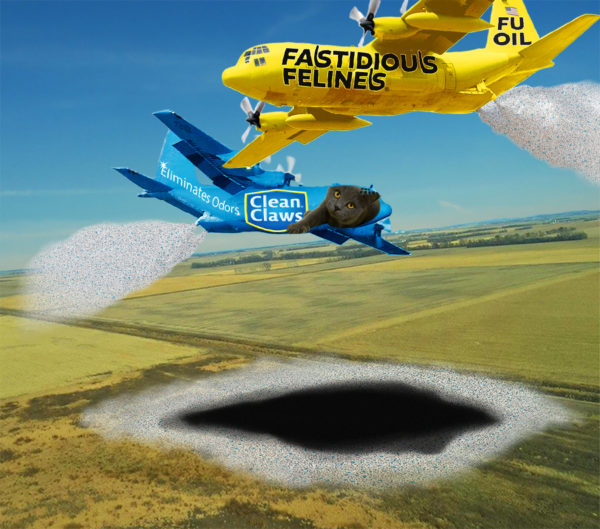
AMHERST, SD-The US Department of Interior and major kitty litter producers are joining forces and calling on all domesticated felines and their owners to curtail use of kitty litter products in the wake of the Keystone pipeline leaks. The first occurring April 2, 2016, near Menno, SD, with a release of 16,800 gallons, and a second larger leak occurring November 16, 2017, near Amherst, SD, soaking farm land with over 210,000 gallons of the crude stuff.
Every home mechanic who owns an old sh*^#y car knows that kitty litter is a coveted material in cleaning up oil that has leaked onto the garage floor. Scale this up a million times, and you get a picture of the massive quantities that have been required to address the Keystone pipeline breaches. And this has put a serious burden on reserves.
“We’re facing massive shortages since these events,” said Jonathan Clay, spokesperson for the North American Kitty Litter Alliance, or NAKLA. “We recommend all indoor cats take some cues from their feral counterparts by utilizing gardens and flower beds whenever possible. We’re calling on owners to re-evaluate seeing their feline companions strictly as indoor cats for the time being.” This means giving Clover Cakes or Buster a free pass when making a break for any cracked doors.
Other conservation efforts include allowing a cat box already brimming with turds and wreaking of ammonia to go much longer before changing, or at least until it elicits a strong gag reflex, or better yet, dry heaves. Luckily an approach most cat owners already practice.
TransCanada, the company that owns the pipeline running from Western Canadian Sedimentary Basin in Alberta to refineries in Illinois and Texas, says it is working with state and federal agencies in applying enough kitty litter to clean up the spill. A spokesperson for the company said, “Because we’re committed to being good stewards of the planet, and even though there isn’t the slightest chance that even one drop of said oil will make its way into the water table, this minor event, which is relatively insignificant to cataclysms the Earth has faced in its 4.5 billion year history, will be properly neutralized, leaving behind a clean and refreshing scent.”